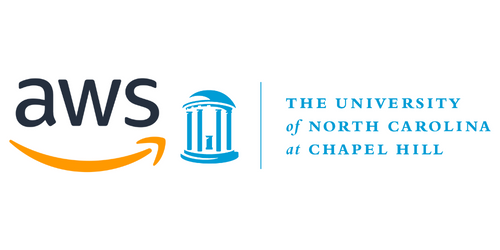
December 1, 2022 – The University of North Carolina at Chapel Hill, through the Eshelman Institute for Innovation, announced a collaboration with Amazon Web Services (AWS) to build an environment for startup creation that uses cloud technology to translate UNC-Chapel Hill digital health research expertise into commercialized solutions.
The collaboration will support 25 projects over 3 years, with the goal of creating, funding, and building 10 successful start-up companies based out of UNC-Chapel Hill. The focus is software-forward digital technologies to advance health and wellness, enhance patient and provider experience, and improve healthcare access across five areas:
- Enterprise Systems & Support: platforms for healthcare systems, clinics, and other enterprise settings
- Clinician Services & Support: platforms primarily for clinicians and clinical support staff
- Patient-Facing Wellness & Support: products that capture, store, or transmit clinical information to guide care
- Patient-Facing Diagnostic & Monitoring: products used to diagnose, guide diagnosis of, or monitor patients
- Patient-Facing Therapeutic Interventions: products that deliver medical interventions and therapies
Through the collaboration, faculty from UNC-Chapel Hill’s health research labs utilize a cloud-native “software factory” to build solutions into production-ready formats that run on AWS. With services like Amazon SageMaker and Amazon Rekognition, as well as secure environments, data solutions, and other artificial intelligence (AI)/machine learning (ML) managed services, researchers develop innovative healthcare technologies that can be validated and then commercialized via University-born startups.
Selected projects are eligible to receive AWS Computing Credits and collaborate with AWS solutions architects and specialists across domains like cybersecurity, biomedical research, high-performance computing, and machine learning for health informatics. AWS engineers provide an architectural approach that contains multiple pipelines equipped with tools, process workflows, scripts, and environments to produce software and infrastructure solutions that are portable, extensible, and secure by design—especially through the utilization of software containerization and microservices. This helps protect UNC Chapel-Hill’s intellectual property, extend research into the market, and grow research-driven impacts through high-quality, rapidly-deployed software.
